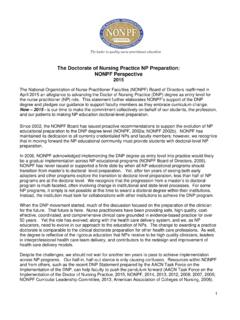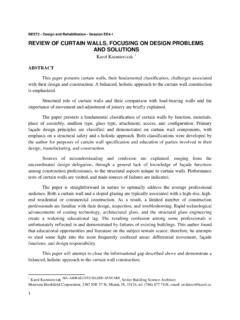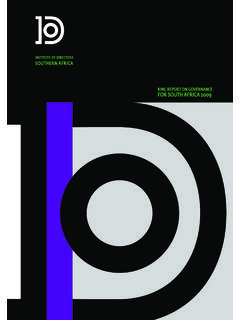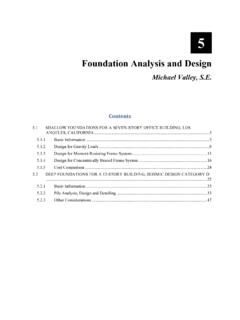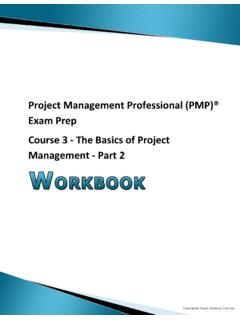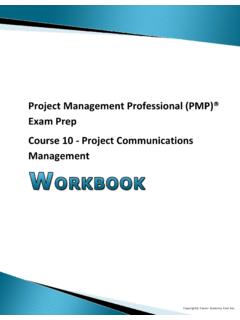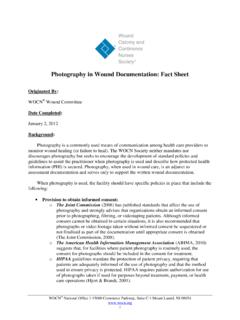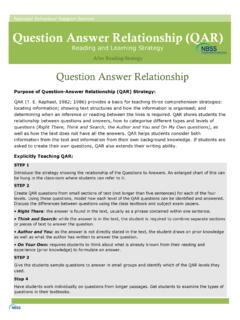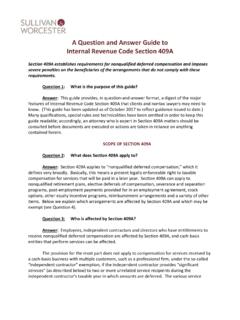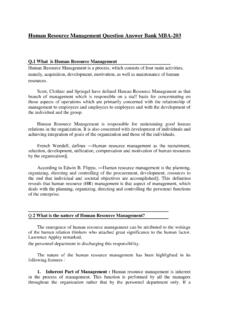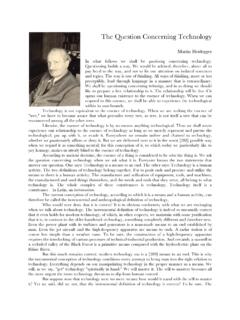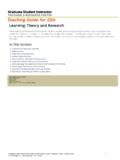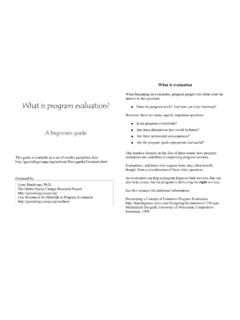Transcription of 36 TOUGH INTERVIEW QUESTIONS And ways to structure …
1 Copyright 2006 Randy Block1 36 TOUGH INTERVIEW QUESTIONSAnd ways to structure the responses1. Tell me about yourself2. (If unemployed): What have you been doing since your last position?3. Why did you leave your last position?4. What would your previous boss say about your performance?5. What did you wish that youaccomplished in your previous job that you were unable to do?6. What is your greatest fear?(Management specific QUESTIONS start with question 30)Frame it: Describe how you are today vs. a long story re-capping your resume. I maximize an organization s productivity. Frame it: Show them that you are interviewing them as well.
2 , I have been very discerning about the position and company that I wish to work for. Frame it: Tell the truth but keep it positive. Say something like: To obtain a position which would fully utilize my talents and strengths. Or, We saw things differently and agreed to mutually part ways . Frame it: Accentuate your success and strengths. My previous boss will substantiate my success in _____. He will mention my strengths in _____ .Frame it: Focus on growth pr productivity aspirations on your part. I was unable to negotiate more funding for my budget. There was a narrow investment focus and extreme market volatility resulting in several setbacks.
3 Frame it: There is really only one wrong answer here that sends up a red flag: The fear of 2006 Randy Block2 7. What are your regrets?8. What is your next career move?9. What are your strengths?10. What are your weaknesses?11. How do you recognize incompetence? Excellence?12. Define your success in problem Tell me about your negotiation it: Regrets mean that you don t have closure on your past. A more positive answer is: I don t have any regrets because I see each setback or mistake as a learning experience. I rarely make the same mistake twice. Frame it: Be careful don t parrot back the position being discussed.
4 , I want to be at the helm of a _____group and be one of those people accountable for financial success and growth. Frame it: Opportunity for you to connect your qualifications to what is required for the position being filled. Mention relevant personal talents as well as work content skills. Have some achievement stories in reserve in case the interviewer wants some it: Focus on a relevant preferred quality on the list in the job description and candidate profile). Concentrate on your relevant transferable skill and natural talents. I am too intense or I work too hard. Or I have excessive expectations of my people.
5 Frame it: Discuss the standards that you have set and how you have dealt with players above and below the it: Story time. Outlinea specific challenge and how you solved it. Then summarize the talents that you it: Story time. Discuss a specific negotiation accomplishment. Mention how you read the situation and cues.(very lowStay away fromCopyright 2006 Randy Block3 14. What is the number 1 achievement of your career?15. What are the top 5 contributions you have made during your career?16. When did you fail? (And how did you remedy the situation?)17. How can you make a contribution to this company?)
6 18. How are you unique?19. Why are you interested in our company?20. Why should we hire you for this position?Frame it: Pick the one that you were the most proud of. Be sure that you were the lead as primarily accountable (revenue or increasing productivity). Make it relative to what the company is looking for. And by the way, only give one!!Frame it: See # 16 and make each of them relevant to the position you are a candidate for. With a list of 5 contributions being asked for, this isnot a time to tell stories. Give the bottom line it: Pick a situation that did not meet expectations for very good reasons.
7 And describe how you fixed it. Add that failureis not learning from an it: this is where your research pays off. Talk from a revenue increasing productivity enhancement it: This canbe answered along the lines of tell me about yourself. Talk about your natural talents and what you intrinsically it: Tell them about why you selected this company to INTERVIEW . Mention the products, services, markets, the reputation etc. Companies like to be chosen and selected as much as you like to be it: !! This is an opportunity to demonstrate the relevance of yourtalents and skills to the job that you are interviewing 2006 Randy Block4 21.
8 What are your compensation requirements?22. Have you worked under pressure? What did you like / dislike about your previous job?24. How long before you could make a contribution to our company?25. Have you ever been asked to resign? What happened?26. What was the most difficult decision you had to face?27. What are your pet peeves?Frame it: Always fend off this question until you have completed all of the interviewing rounds. Say, When we have completely discussed the position and finished the screening, I will better be able to answer that question . Or, I am sure if we have a match, negotiation of compensation will be relatively easy.
9 Or I m sure that you will make the very best offer that is fair to you and to me when the time comes. It s OK to tell a recruiter the details of your compensation. Frame it: Have a story that describes the circumstances that dramatically underscores this. Be sure it s a successful it: On the positive side, pick those aspects that will be the most relevant to the job and company you are interviewing. On the downside, something like: I wish I could have used more of my skills and talents. Do not trash anyone or thing even if they really done you wrong. Frame it: Again. This will give you the opportunity to ask some QUESTIONS about the challenges facing the company, the group and the position.
10 Once you are armed with the facts, you can then share your plan to execute your it: Be truthful here. Say things like: We agreed to disagree or We were both disappointed that there was not a better outcome. The decision was made in the best interests of the company that I resign. Frame it: This is anopportunity to set up a complex problem and/or a decision that was highly time-sensitive where getting additional facts was no an option. Of course you made the right one!Frame it: Say something like: I manage my peeves pretty well. That being said, I have a pet peeve around people who don t make their commitments stick.
